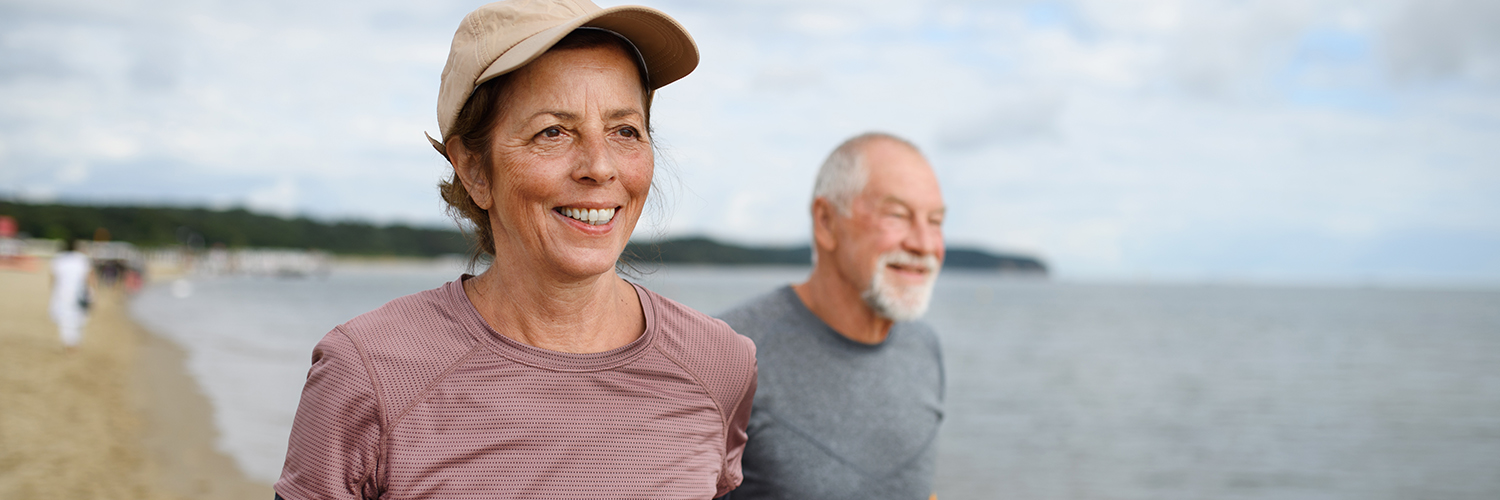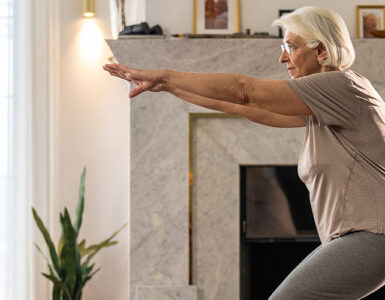Falls are a major health concern for older adults. In those over 65, falls that occur either in or outside of the home are the leading cause of injury-related death, hospitalization and emergency department visits.
Falling and becoming injured can significantly impact an older adult’s independence and quality of life. Fortunately, many falls are preventable when proactive measures and modifications are taken. Habits like exercising, stretching, wearing supportive footwear and removing hazards from the home can go a long way in preventing falls in older adults.
8 Fall Prevention Tips for Seniors
1. Do Strength-Training Exercises Regularly
Maintaining muscle strength is essential for preventing falls, which is why regular strength training can be extremely helpful for improving stability. Strength (or resistance) training exercises, like lifting weights or doing weight-bearing exercises (climbing stairs, hiking, doing squats etc), also help with balance and coordination. The use of physical therapy is also beneficial for maintaining strength and physical health.
Community centers, libraries and local gyms are great places to look for affordable resistance-training exercise programs tailored for seniors. If you prefer to exercise at home, simple exercises such as leg lifts, sit-to-stands or light weightlifting can make a significant difference in your physical health.
Remember, it’s important to do exercises that are appropriate for your (or a loved one’s) current fitness level.
2. Focus on Balance Improvement
Balance exercises can include activities like Tai Chi, yoga and simple drills like shifting your body weight from one foot to another. These movements help enhance stability, strength and mobility simultaneously, which are key for injury and fall prevention.
The best way for seniors to gradually increase the difficulty of balance exercises is under the guidance of a physical therapist or through classes designed for older adults.
3. Maintain Flexibility
Flexibility helps in maintaining range of motion, which is essential for balance, joint health and muscle function. Yoga, pilates and stretching exercises are beneficial in keeping muscles and joints limber so everyday movements are easier. Seniors should focus on gentle stretches, such as lunges and toe touches, that do not strain their bodies but help to maintain mobility.
4. Discuss Medication Use with Your Doctors
Reviewing medications with your healthcare providers is important for addressing any side effects that you might experience such as dizziness, weakness or impaired balance that can potentially lead to falls.
Seniors should have regular check-ups to review their medications’ effects on their overall health and make adjustments as necessary. It’s also important to take medications as directed, including the correct dosages at the right times, to limit the risk of side effects and impairments. It’s also recommended that you always keep a medication list on you.
5. Get Regular Vision and Hearing Checks
Impaired vision and hearing can greatly increase the risk of falling by affecting balance and spatial awareness. Regular check-ups can ensure that glasses and hearing aids are appropriately adjusted, and any deterioration in sight or hearing can be addressed promptly before it becomes a safety issue.
6. Make Sure Your Home Is Safe
Making your home safer by removing tripping hazards and clutter can significantly reduce your risk of injuries. Consider installing banisters and handrails in stairways and bathrooms, securing rugs, and ensuring that living spaces are clutter-free and well-lit to prevent accidents.
Other helpful steps include securing electrical cords and keeping them out of walkways, lighting halls with nightlights, stabilizing furniture, and installing non-slip mats on the ground in bathrooms and common areas.
7. Wear Supportive Footwear
Wearing proper footwear is an often-overlooked aspect of fall prevention. Shoes with non-slip soles, good support and a proper fit are the best options. Avoid loose slippers, sandals or walking barefoot to help prevent slips.
8. Meet Your Nutritional Needs to Maintain Muscle and Bone Health
Maintaining good nutritional health can keep you mobile throughout older age, as deficiencies can weaken muscles and bones, making falls more likely.
Seniors should eat a balanced diet rich in protein, calcium, and vitamin D to support bone and muscular health. These nutrients come from foods like lean meats, vegetables, fish and legumes. Consulting with a nutritionist can help in planning meals that meet your specific nutritional needs.
The Stony Brook Trauma Center actively contributes to fall prevention in seniors through a variety of educational workshops hosted across Suffolk County in libraries, senior centers and other community venues. As the only Level 1 Trauma Center for adults and children in Suffolk County, Stony Brook is dedicated to preventing traumatic injuries through community-focused initiatives.
Our programs, which are backed by the latest research and focus on practical, evidence-based strategies, include the “Stepping-On Workshop,” which has been shown to reduce fall risks by up to 50 percent. We also offer “Lessons in Tai Chi for Arthritis and Fall Prevention,” which emphasizes strength and balance, and the “Matter of Balance Workshop,” which aims to increase activity levels and reduce fall fears among older adults.











